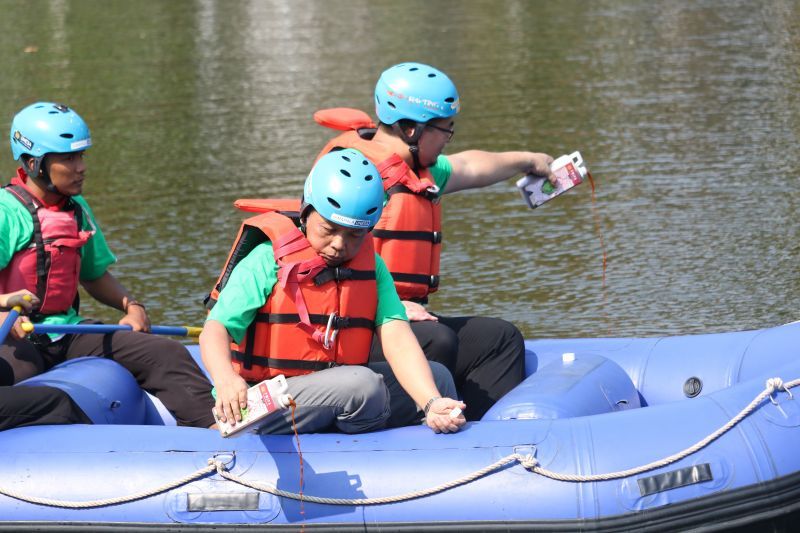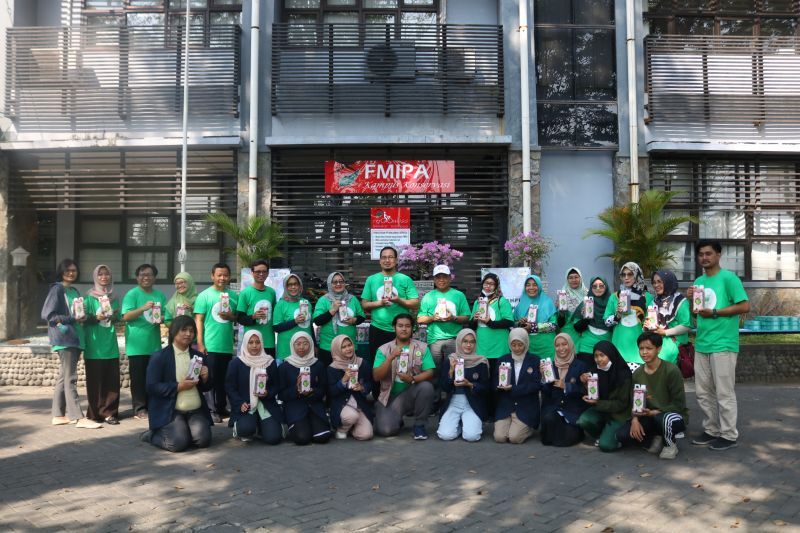Sustainable Conservation Strategies: UNESA Cares for Campus Water Ecosystems

Unesa.ac.id, SURABAYA—World Environment Day is celebrated every June 5th. To commemorate this event and as a commitment to raising awareness for taking positive actions for the environment, the Faculty of Mathematics and Natural Sciences (FMIPA) UNESA, along with Eco-Campus, poured eco-enzymes into the Ketintang Campus lake on Wednesday, May 31, 2023.
Prof. Dr. Wasis, M.Si., Dean of FMIPA, stated that this activity is part of the faculty's commitment to developing natural sciences and realizing UNESA as a conservation campus. This event was held as a tangible effort to focus on improving the quality of the lake's water ecosystem.
"The lake area on our campus has an aesthetic function, making it comfortable as an educational area, and also has a conservation function. So the water is not just a decoration or for flood control during the rainy season, but the ecosystem within it needs to be maintained through the pouring of enzymes to keep the water healthy and the organisms within it growing well," he said.
According to him, tangible environmental conservation efforts must be a collective step from leaders to students. The culture of caring for the environment must always be instilled in everyone, regardless of who they are and what their position is. Because it is an obligation. It doesn't need big actions, but can start from small things like proper waste disposal and turning off unused electrical appliances.
"What we sow, we will reap. That becomes our benchmark for being friendly with nature, because something like this, if not balanced, will definitely cause harmful impacts," he added.

Dra. Herlina Fitrihidajati, M.Si., as the Eco Campus advisor, explained that healthy water quality has specific criteria. In the irrigation system like at UNESA's lake, one of the criteria is based on pH or acidity level. She mentioned that from various studies, the normal acidity level is around seven.
"After our research, the water in UNESA Ketintang Lake has a pH level of 8.4, which is higher than normal acidity and is categorized as alkaline water, which takes a long time to return to normal," she explained.
She mentioned that the use of eco-enzymes can accelerate the neutralization of water pH because they contain active enzymes from processed microbes. The use of 60 liters of eco-enzymes is based on research using orange and pineapple peels combined with research and journals that use a ratio of eco-enzymes to water, which is 2.5 ML for 1 liter of water.
Therefore, in the case of UNESA Ketintang Lake, 60 liters of eco-enzymes are needed for a lake volume of approximately 4500 liters. "The waste from these eco-enzymes is not discarded but processed again as fertilizer, so the use of organic waste can be maximized," she said.
Junaidi Budi Prihanto, S.KM., M.KM., Ph.D., Vice Rector for Research, Community Service, Innovation, Publication, and University Ranking, mentioned that this activity has been ongoing since 2016 in collaboration with several similar communities and various institutions. "In the future, these eco-enzymes can be produced on a large scale because their benefits can be varied, such as detergents, disinfectants, and many more," he explained.
Prof. Nadi Suprapto, S.Pd., M.Pd., Ph.D., Director of Innovation, Ranking, and Scientific Publication, added that this activity also supports UNESA in the UI Greenmetric university ranking and THE Impact Ranking SDGs 14, which focuses on environmental conservation, especially water conservation. This conservation movement is expected to raise awareness among the UNESA academic community to be more concerned about the environment, especially on campus areas.[]
***
Author: Mohammad Dian Purnama
Editor: @zam Alasiah
Photo: UNESA Public Relations Team
Share It On: